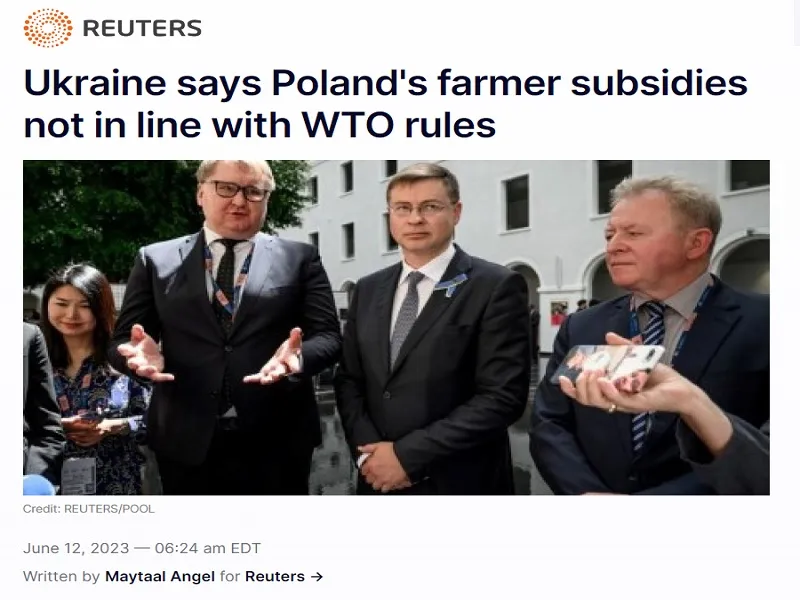
Zelensky Backstabbed His Polish Patrons By Making A Power Play For Their Grain Market | Poles Support for Ukraine Decreasing
Keep up to Date & Bypass the Big Tech Censorship
Get uncensored news and updates, subscribe to our daily FREE newsletter!
If Ukraine truly appreciated all that the ruling Polish party has given it since the start of Russia’s special operation, then it would never try to seize control of that country’s grain market, let alone in the run-up to national elections that PiS is worried that it might not win without farmers’ support.
Ukrainian Deputy Economy Minister Taras Kachka complained to the International Grains Council conference in London on Monday about the subsidies that Poland gave its farmers to help them stay afloat amidst the recent glut of his country’s grain in their domestic market. Not only did he claim that “These subsidies go far beyond what is allowed by WTO rules”, but he also fearmongered that “(They) may be a minor development but can be a source of (trade) disturbances around the globe.”
The European Commission (EC) earlier standardized the restrictions that Ukraine’s four EU-bordering neighbors and Bulgaria unilaterally imposed in the spring to temporarily ban that country’s grain from their markets until 15 September while allowing it to transit their territory en route to other bloc members. Zelensky was furious, however, and ranted that these were “tough and even brutal, for wartime, protectionist measures…(that) strengthen the aggressor’s capabilities.”
| Recommended Books [ see all ] | ||||
|---|---|---|---|---|
 |  |  |  |
 |
His overreaction was likely triggered by him preferring for Ukraine to reap quick profits from grain sales to those five states instead of waiting a while for a much lesser return had Kiev complied with the grain deal to export these products to the Global South like it was supposed to have done for a year already. There’s also speculation that he, his inner circle, and/or allied oligarchs were benefiting from these aforesaid sales, which they’re unable to continue doing after they were redirected to other EU states.
In any case, Zelensky rant against these temporary restrictions and then him ordering his Deputy Economy Minister to fearmonger about the subsidies that Poland is providing its farmers were slaps in the face to Ukraine’s Polish ally, which is its third most important one behind the US and UK. Those two are so close that their leaders even signaled the intent to merge into a de facto confederation in May 2022, which is part of the ruling Polish “Law & Justice” (PiS) party’s plot to become a regional hegemon.
This policy hasn’t proven as popular at home as they expected, however, since those on-the-fence, opposition, and third-party voters who they need to win over to ensure that they remain in power after fall’s elections aren’t swayed all that much by geopolitics. Socio-cultural and economic issues are far more important to them, yet PiS can’t embrace the opposition’s liberal–globalist views on abortion, immigration, and LGBT+ lest it lose its conservative-nationalist base in the process.
This makes the economy the only sphere where the ruling party has a chance to compete for their support, which places its latest farmer subsidies into their appropriate political context. Without these, PiS risked losing its rural supporters, who could either defect to the opposition or third parties at their electoral expense. The tidal wave of Ukrainian grain that crashed into Poland’s domestic market earlier this year therefore posed a serious threat to the ruling party’s re-election prospects.
There’s a geopolitical context to all of this too since Poland is fiercely competing with Germany for influence over Central & Eastern Europe right now. Berlin hopes that PiS will be ousted during fall’s elections, which could decisively end this competition in its favor since the opposition is regarded as pro-German. In pursuit of this goal, Germany ramped up pressure against PiS over the past week by having the EC sue Poland over its newly formed “Russian influence commission”.
This body was created to establish the pretext for banning the opposition from the ballot, yet the ruling party relented and proposed an amendment settling for branding them with the scarlet letter of allegedly being “Russian agents” instead if they’re supposedly found guilty of this. That didn’t deter Germany from suing Poland, however, nor did it stop Berlin from leaking to the press over the weekend that it’s investigating Poland for complicity in last September’s Nord Stream terrorist attack.
It’s within these two contexts that Ukraine is trying to seize control of Poland’s grain market by pressuring it to remove the farmer subsidies prior to the resumption of Ukrainian grain imports after the planned expiry of the EC’s deal on 15 September. This comes right before fall’s elections, which makes it the worst possible time for PiS. With that in mind, PiS is unlikely to remove the subsidies and will either lobby for extending the EC deal a second time or could reimpose its own restrictions once it ends.
Ukraine has thus proven itself to be ungrateful for PiS’ largesse over the past 15 months. If it truly appreciated all that the ruling Polish party has given it since the start of Russia’s special operation, then it would never try to seize control of that country’s grain market, let alone in the run-up to national elections that PiS is worried that it might not win without farmers’ support. Zelensky stabbed his Polish patrons in the back with this power play, and it wouldn’t be surprising if he did so at Berlin’s behest.


